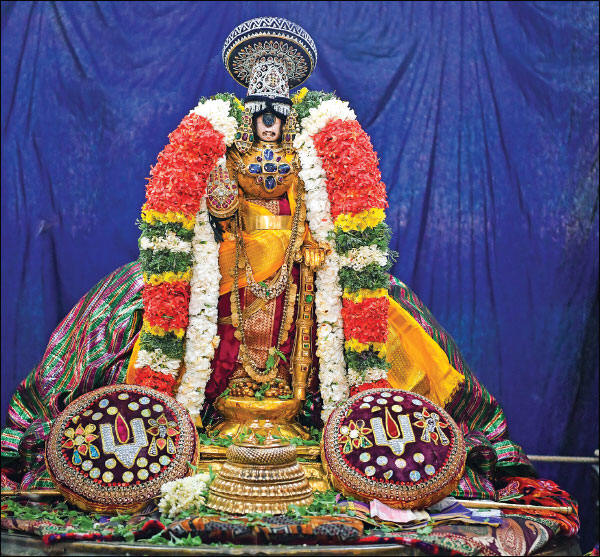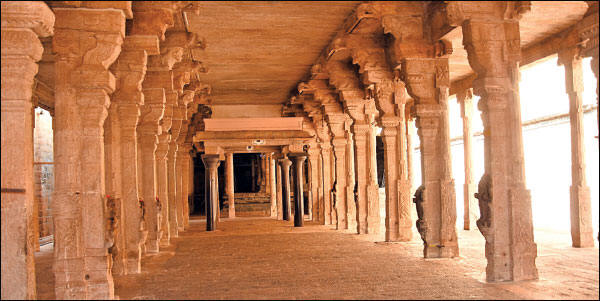Author: Indira Soundarrajan
Posted Date November 20, 2018
ரங்கராஜ்ஜியம்- 17
இந்திரா சௌந்தர்ராஜன் Author: Indira Soundarrajan

‘Anthaṇarē! I will make you live a prosperous life before your brother. You ask whatever you need from me. In connection with the Aśvamēdha Yāgam, I must give gifts to the Brahmins. Let that gift be considered to be a gift to you,’ he said. 1
“Then what?’ 2
“After this the Vāmaṉa Līlai took place. ‘O Father, you do not give me anything more than I need. If you give me a piece of land equal to the length of three steps with my foot, that should be enough,’ said Vāmaṉar, evoking laughter. 3 (Vāmaṉar was the Avatar of Viṣṇu.) 3
‘Insignificant. It is noticeably insignificant! Three feet! Ask for 30 million feet. I will give you. This world is mine. This sky is mine. The universe in under my control,’ said the king with pride and hubris. Mahaṛṣi after certain interval saw the Kiḷi Chōzaṉ. 4
Kiḷi Chōzaṉ: “Mahaṛṣi, why do you cast such a look?” 5
Mahaṛṣi: ‘Arrogance is evil. That too Asura arrogance is devilish evil. It takes ages to know oneself. Once you begin to know ourselves, we really do not know ourselves. We do not choose our parents. We do not decide our gender. Once born, we grow up. As we grow up, we live our lives. As we live our lives, we perceive. As we perceive, be become knowledgeable. With knowledge, we obtain realization. The environment makes us grownups. After this, we do not know what will happen. As we go, we discover. If we do the math, look at the dust particles in this universe. We are one dust particle. This is nature! But, when the world illusion puppeteers us, do you see how we dance?’ 6
Kiḷi Chōzaṉ: “I understand, Mahaṛṣi. As you explain this in such great detail, I get goosebumps. I feel I should not entertain or fall prey to arrogance. I get that forewarning.” 7
Mahaṛṣi: “That is why I cast such a look. Understanding the visual cues, you gave me the right answer.” 8
Kiḷi Chōzaṉ: “Maharishi! What did Vāmaṉar say next?” 9

Mahaṛṣi quotes Thunthu here. “I should not sustain death caused by me, others, Brahma, and Īśaṉ.” Obtaining such Varam (boon) is not enough. Viśvarūpa Vāmaṉa Vishnu to the consternation of Thunthu said, ‘Thunthu! You lost your reason and intellect by including yourself as the cause of your own death.’ 10
Thunthu: ‘If that is so, will I sustain death by my own action?’ 11
Vishnu: ‘See whether that will occur.’ So saying, Viśvarūpa Vāmaṉa Vishnu thrust the earth with one leg, creating a deep hole and Thunthu lost his balance and fell into the pit. The great eruption of mud fell back into the hole burying Thunthu. Viśvarūpa Vamana Vishnu became the Lord of the Vaikuṇṭam. The Dēvās including Brahma showered Vishu with the eulogy. 12
Kiḷi Chōzaṉ in delight: “What rarity? What a wonder? What a joy?” 13
Mahaṛṣi: You are excited about this episode. Just wait to hear the story of Bali king in his arrogance made Vishnu take Vāmaṉāvatāram (Vishnu’s Avatar as a dwarf Brahmana). That will excite and exhilarate you more.” 14
Kiḷi Chōzaṉ, thinks, “I am a lucky person, supremely so. I dug up and restored such Mūrthy’s temple. The more I think, the more goosebumps I get.” He was jumping for joy and said to the Mahaṛṣi, “Please tell me about the second Avatara of Viṣṇu as the Dwarf. 15
Kiḷi Chōzaṉ with great devotion and attention listened to the Ṛṣi. The Nīli Vaṉa Mahaṛṣi began to narrate the second part of Vāmaṉāvatāram. 16
Bali (Death; sacrifice) as a word induces fear in all of us. The word signifies the natural separation of life from the body (= signifies natural death). In truth, the word ‘Bali’ also means ‘Mukthi.’ (= Liberation). This liberation takes place depending on Iṛainimittham (= இறைநிமித்தம் = God’s wish and need). 17
Temples have Bali Pīdam (பலி பீடம் =Sacrificial platform). Here, with worship, humility and homage, we sacrifice the bad qualities: the I-ness, egoism, ignorance and such. We are bound to purification. Virōcana named his son after Purification and God’s way and wish. This Virōcana is not some unknown person: He is the cause for the descent of Narasimhāvatāram. He is the son of Viṣṇu’s devotee, Prahalāthaṉ. Virōcaṉa’s son, Prahalāthaṉ’s grandson, was named ‘Bali.’ 18
Since he was raised in the spirit of Viṣṇu Bakthi of his grandfather Prahalāthaṉ, his name was Mahābali. The grandfather was his spiritual teacher. They all belong to the family of Asuras (A=Not, Suras = gods = Not gods = Anti-gods). Asura Guru Śukrācārya became his Guru, separated Bali from Prahlāda, made him subject to desires, passions, and bonds and forced Indra and his Dēvās to become Mahābali slaves. 19
In the Asura lineage, the great-grandson of Hiraṇyaṉ, ‘Bali’ was disposed to Asura Buddhi (Demoniacal personality) and arrogance. Rājaguru Śukrācārya told Bali, “You should accomplish what your great-grandfather failed to do. The 14 worlds should become Asura Sāmrājyam under your rule, and the Dēvās must live as your servants.” That was his daily advice. He added, ‘if Asura family should survive, Yagñam (Fire Sacrifice) must be performed. Asura Sakthi must be greater than the Dēvasakthi. If there were an eminent deed, Yagñam is the one,’ the Rājaguru Śukrācārya endorsed and insisted on performing Yagñam. 21
Mahābali performed the Yagñam and distributed the sacrificial offerings to the Asura Sakthis. The world’s equilibrium was upset. The Ṛṣis and Muṉis could not perform the Ātmārtha Tapas (Austerity for one’s own sake). The sattvic people lost their mental peace. Sexual profligacy increased with an exploding population of Asuras. Satyam and Dharma weakened gradually. Bali’s administration was not of the nature of Asura-cruelty. At the same time, there was not one iota of divinity. 22

The worried Indra and the Devas, as usual, took refuge with Mahāviṣṇu and complained about the strange Asura rule and the certainty of the destruction of Satyam and Dharma. 23
Mahāviṣṇu reassured them, ‘In time, your deficiencies will resolve. Without fear and tremulousness, continue your prayer and austerity. On occasions like this, your decisions will give strength for change. 24
The Ṛṣis said to Mahāviṣṇu, “We are unable to perform austerities. Every time we exercise control over our impulses, an Asura from nowhere appears before us and employs subterfuge to defeat our efforts. If we resist them, they kill us. Some Asuras force us to use sacrificial offering to strengthen the Asura Sakthi. Because of it, the sacrificial fire offerings come to a full stop, and the Devas become weak from hunger.” 25
Mahāviṣṇu: ‘Hereafter, this will not happen! I will be taking human birth from the womb of Athithi (Āditi), the wife of a Ṛṣi. Kāśyapa is my father in this birth. Kāśyapa fathered the Asuras: Thunthu and his Asura progeny. The Līlai (Divine play-acts) will be the indestructible lesson for the Asuras. Therefore, you continue your fire sacrifice. You will see the Asura Sakthi gradually wane and die. Soon, Mahāviṣṇu implanted himself in the womb of Āditi and grew as a human fetus. 26
As the fetus grew in the womb of Āditi, the Asuras gradually lost their strength. Long slumber, indolence, indigestion, weakness of body, mental agitation and such physical maladies afflicted the Asuras. Śukrachāriar knowing the maladies of the Asuras by his vision realized the cause as the pregnancy of Āditi. He told Mahābali about his intuitive vision. Mahābali should have become angry but wondered ‘whether Mahāviṣṇu was this powerful?’ 27
Mahaṛṣi: “I did not tell you this secret for amazement. You should make yourself stronger. If you don’t, you, like your great-grandfather, become Viṣṇu Baktha, and bring the Asuras under the control of Devas.” 28
Mahābali intended to perform the fire sacrifice under the guidance of Śukrachāriar and gain greater strength. Āditi in the month of Puraṭṭāsi (Sep-Oct), under bright side (waxing moon) of the moon, Śravaṇa Nakṣatra (22nd) on the 12th digit of the moon in the eighth division (of the 15 divisions of the day = auspicious time) gave birth to a baby boy, who was Mahāviṣṇu and whose growth was stunted throughout his childhood and appeared as a dwarf in adulthood. 29 Hypopituitarism = dwarfism
Since this child took birth to alleviate and eradicate their miseries, Sūrya (the Sun God) initiated him in the Sāvitrī Mantra. Guru Bṛhaspati initiated him with Brahma Sūtra and gave him the sacred thread. Kasyapa gave him ‘Muñji’ (Girdle formed of the reed, worn by Brahmin celibate students). Bhūdevi gave him a mat, tiger or deerskin. Chandra, the moon god, gave a staff. His mother Āditi gave a loincloth. Brahma gave earrings. Kuberan gave a begging bowl. Parvati gave the first alms in the begging bowl. 30
Bhiradvāja Muni conducted the cord ceremony and gave him Vedic instructions. Āṅgīrasa Muni initiated him in the Sāmaveda set to music. 31
In the conduct of Avatara festivities, all planned events took place perfectly. The short Vāmaṉamuṉi appeared bright and shining. He was lofty as the Avatara Puruṣa. 32
King Bali was readying for the Aśvamēdha Yāgam in Kurukṣetra. He conducted such Yāgams umpteen times previously. A person who makes this sacrifice for one hundred times irrespective of his birth history and heritage elevates himself above Indra. Ambrosia comes looking for him. He becomes the owner of Divine Treasures. Mahābali was on the cusp of his 100th Yāgam. 33
The most important element in this Yāgam is giving. If the beneficiaries feel shortchanged, the sacrifice will not attain perfection and completion. Mahābali performed the sacrifice impeccably (with no faults or deficiencies). Vāmaṉamuṉi was on his way to get his share of the largess. A strange thing happened when he arrived. The sacrificial offerings reserved for the Asuras began its flow to Vāmaṉamūrthy. 34
The Asuras made vociferous protests, and Mahābali was shaken. He asked Guru Śukrāchāriar, ‘what is the reason for this imbalance?’ He closed his eyes, delved deep into meditation and saw the coming of Srīmahāviṣṇu in the human form of Vāmaṉa. He shook like a leaf. 35
Will Continue
- தொடரும்...